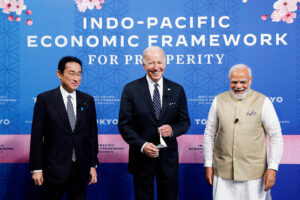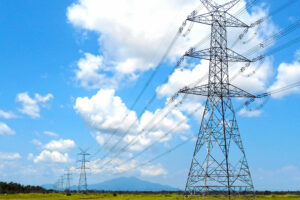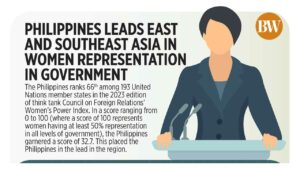USTR hopes to lock down labor, agri, regulatory provisions in July round of IPEF negotiations

THE United States Trade Representative (USTR) said it hopes to lock down provisions of the Indo-Pacific Economic Framework for Prosperity (IPEF) trade deal dealing with labor, agriculture, and regulatory best practices.
Deputy USTR Sarah Bianchi said a roundtable session on Tuesday that the Philippines is especially engaged in the labor provisions of the IPEF.
The IPEF’s fourth negotiating round will take place in Busan between July 9 and 15. The previous negotiating round took place in Singapore on May 8-15.
“This is kind of the point in the negotiations where it’s time to close some text. So, it’s a really important round coming up for us. I think just all getting on the same page about what we need to do to deliver by the end of the year,” Ms. Bianchi said.
According to Ms. Bianchi, the labor side of the talks include “some really ambitious and exciting texts for workers. We have found the Philippines to be really engaged on that text and supportive. We look forward to spending the next few rounds really working with Philippines and others to hopefully make some real progress in that space.”
“A lot of the early rounds are exchanges of ideas and people giving feedback. Now, it’s kind of where the rubber meets the road. It really is about landing some text that can kind of get us momentum going into the end of the year,” she added.
The IPEF, launched by US President Joseph R. Biden, Jr. in May last year, seeks to enhance US economic engagement in the Indo-Pacific region. The other IPEF participants are Australia, Brunei, Fiji, India, Indonesia, Japan, South Korea, Malaysia, New Zealand, Singapore, Thailand, and Vietnam.
The economic framework has four pillars: trade; supply chains; clean energy, decarbonization, and infrastructure; and tax and anti-corruption measures.
Ms. Bianchi said the IPEF could benefit the Philippines in terms of sustainable agriculture, environment, and climate initiatives.
“The IPEF really gets to a lot of those… we can have more sustainable agriculture, arrangements and agreements. We can do more things together on the environment and climate,” Ms. Bianchi said.
“When you think about trade, in this day and age, sometimes these kinds of barriers, whether it’s how customs work together and things that may seem a little technical. If you can have some standards that make it easier to do business, it can actually can be very meaningful. So I think that the Philippines will be a big beneficiary of IPEF,” she added.
Ms. Bianchi reiterated that a critical minerals agreement (CMA) between the Philippines and the US is not expected soon.
“I would say there isn’t anything on the table right now in terms of doing something like we did in Japan. But the partnership between the US and the Philippines is very strong,” Ms. Bianchi said.
The Department of Trade and Industry has sought a CMA with the US, which signed such a deal with Japan on March 28. Such agreements are expected to strengthen mineral supply chains and promote electric vehicle technology. — Revin Mikhael D. Ochave




